Home Heating Solutions
Heat Pump Efficiency in Multi-Family Buildings: Challenges and Solutions
Struggling with heat pump efficiency in multi-family buildings? Discover the challenges and solutions that can unlock significant savings and enhance your investment potential.
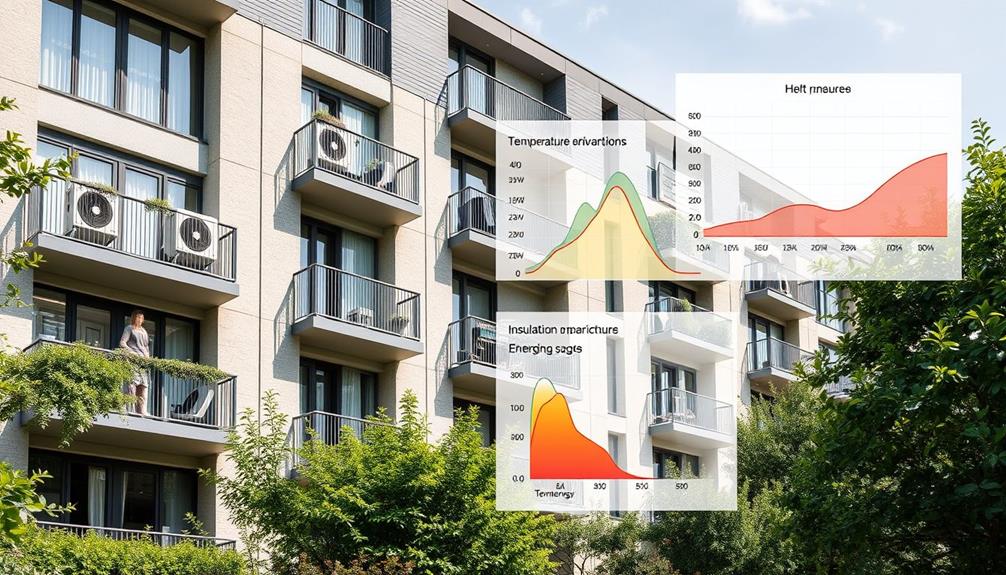
Heat pumps can greatly boost energy efficiency in multi-family buildings, cutting operational costs by 30% to 60%. However, you might face challenges like high upfront costs, complex retrofitting, and the need for proper maintenance to guarantee peak performance. Additionally, air-source pumps can struggle in extreme temperatures. Yet, the long-term savings, improved indoor air quality, and potential tax incentives make them an attractive option. By integrating smart technologies and renewable energy, you can enhance efficiency even further. There's more to explore about overcoming these challenges and maximizing your investment potential in heat pump technology.
Key Takeaways
- Retrofitting existing infrastructure for heat pumps can be complex and costly, requiring updates to ductwork and compliance with building codes.
- Upfront costs deter property owners despite long-term energy savings and potential tax incentives associated with heat pump installations.
- Ensuring proper maintenance is essential to maintain energy efficiency and optimal performance of heat pump systems in multifamily buildings.
- Integrating smart technologies and renewable energy sources can significantly enhance heat pump efficiency and reduce overall energy consumption.
- Education on the long-term benefits of heat pumps can help overcome financial concerns and encourage investment in energy-efficient systems.
Overview of Heat Pumps
Heat pumps are a game-changer in energy-efficient heating and cooling for multi-family buildings. These versatile systems transfer heat between indoor and outdoor environments, providing both heating and cooling capabilities. By utilizing either air-source, ground-source, or water-source technology, heat pumps can adapt to your building's specific design and location. This flexibility is significant for maximizing energy efficiency across different types of multifamily buildings.
Additionally, understanding thermal energy transfer basics can enhance system performance, ensuring peak operation.
One of the standout features of heat pumps is their ability to reduce energy consumption by 30% to 60% compared to traditional HVAC systems. This reduction not only lowers utility bills but also supports sustainability efforts. When powered by renewable electricity, heat pumps operate with near-zero emissions, making them a vital component in decarbonizing multifamily housing.
However, it's important to recognize that the efficiency of heat pumps can be affected by external temperature conditions. For instance, air-source heat pumps may experience some performance degradation in extreme cold weather.
Understanding these factors helps you make informed decisions when implementing heat pump systems, ensuring your multifamily building benefits from their energy efficiency potential.
Benefits for Multifamily Housing
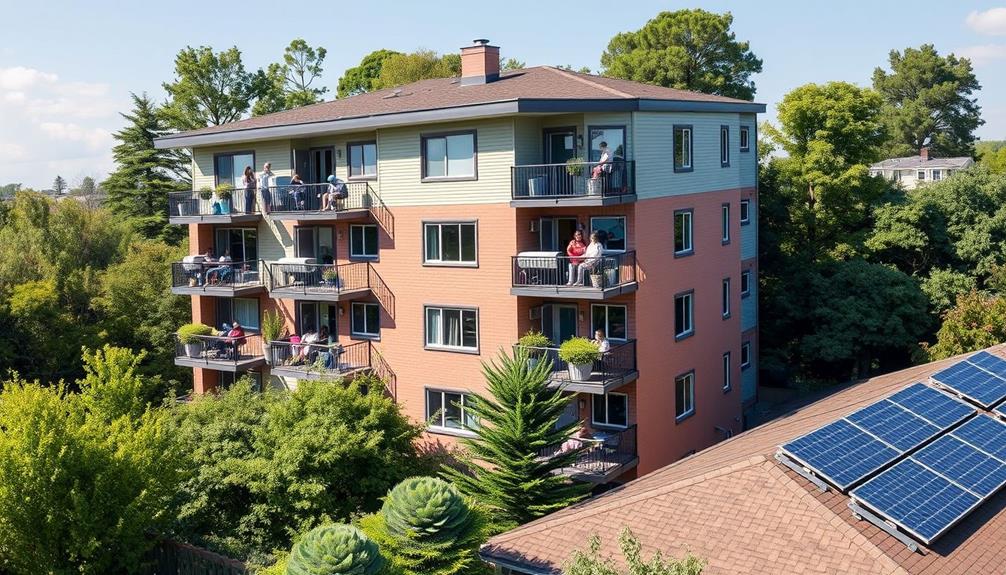
When you consider heat pumps for multifamily housing, you'll find a range of benefits.
They can considerably cut your operational costs while enhancing indoor air quality and offering design flexibility for varying layouts.
Additionally, incorporating stress management techniques can contribute to the overall comfort of the living environment, aligning with the holistic lifestyle approach that promotes well-being.
These advantages not only make living spaces more comfortable but also more efficient.
Cost Savings Potential
Investing in heat pumps for multifamily housing can lead to remarkable cost savings. These systems can reduce energy consumption by 30% to 60% compared to traditional heating and cooling options, which means lower utility bills for you and your tenants. While the initial investment for heat pump installations might be higher, the long-term savings can enhance net operating income by up to $5 per square foot.
Here's a glimpse of the financial benefits:
| Factor | Impact |
|---|---|
| Energy Consumption Reduction | 30% to 60% |
| Potential Net Operating Income | Up to $5/sq. ft. |
| Maintenance Costs | Typically lower |
Additionally, with fewer moving parts, maintenance costs for heat pumps are generally lower, making them more cost-effective over time. You may also benefit from potential tax incentives and rebates, further offsetting initial costs. By choosing energy-efficient heat pumps, you're not just investing in better technology; you're also securing significant cost savings potential for your multifamily property.
Enhanced Indoor Air Quality
In multifamily buildings, the benefits of heat pumps extend beyond cost savings to greatly enhance indoor air quality. By eliminating fossil fuel combustion, heat pumps reduce indoor pollutants, considerably promoting occupant health.
Additionally, their role in regular hydration is essential, as maintaining proper humidity levels can help alleviate respiratory issues common in densely populated settings. You'll find that their ability to improve ventilation helps decrease the likelihood of mold and moisture issues, which are common in densely populated settings.
When residents enjoy better indoor air quality, they often report higher satisfaction levels due to improved thermal comfort. This is vital in creating a pleasant living environment, especially during extreme weather conditions. Health studies indicate that enhanced indoor air quality can lead to decreased respiratory issues among residents, making it an essential factor in multifamily housing.
Moreover, gout management insights suggest that reducing indoor pollutants can also benefit individuals with respiratory conditions.
In addition, integrating heat pumps with advanced filtration systems can further elevate air quality, ensuring that the air you breathe is cleaner and healthier. By prioritizing these technologies, you not only enhance the well-being of residents but also create a community that values health and comfort.
To conclude, heat pumps are fundamental for improving indoor air quality, ventilation, and overall thermal comfort in multifamily buildings, leading to happier and healthier living spaces.
Design Flexibility Options
Heat pumps bring remarkable design flexibility to multifamily housing, allowing for tailored installations that fit specific layouts and maximize energy efficiency. For instance, utilizing geothermal energy generation can enhance the efficiency of ground-source heat pumps, tapping into the Earth's consistent thermal energy.
You can choose from air-source, ground-source, or water-source heat pumps, all of which can seamlessly integrate into various architectural designs without sacrificing aesthetics or functionality. This versatility guarantees that every building can benefit from an efficient heating and cooling solution.
One of the standout features of heat pumps is their ability to serve dual purposes. By providing both heating and cooling, dual-purpose heat pumps reduce the need for separate systems, optimizing space usage and lowering installation costs.
This adaptability also makes it easier to incorporate renewable energy sources, like solar panels, into your multifamily projects, boosting sustainability.
Moreover, the enhanced design options of heat pumps can greatly improve indoor air quality and comfort levels for residents. This not only leads to higher tenant satisfaction but also boosts retention rates.
Implementation Challenges
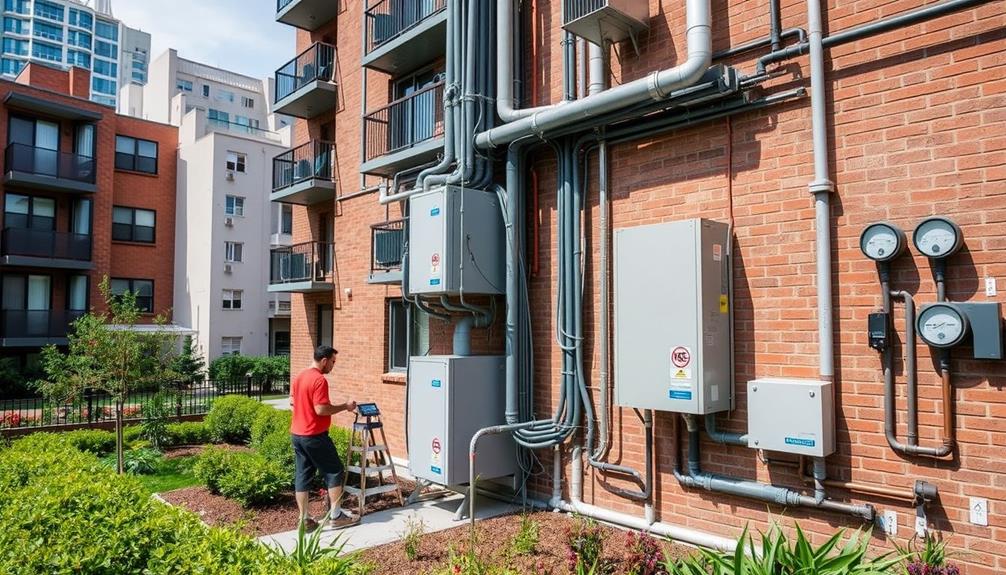
When considering heat pump installation in multi-family buildings, you'll face upfront cost concerns that can be a major deterrent.
Additionally, ensuring proper maintenance and energy efficiency, similar to the way pool heaters maintain comfortable water temperatures, can greatly influence the decision-making process.
Retrofitting existing infrastructure adds another layer of complexity, often requiring extensive modifications.
These challenges can make it tough to fully embrace the benefits of heat pump technology.
Upfront Cost Concerns
Upfront costs pose a significant challenge for property owners considering heat pumps for multifamily buildings. The initial installation expenses can be considerably higher than those of traditional HVAC systems, often discouraging you from making the investment, even with the promise of long-term savings.
While heat pumps can cut energy consumption by 30% to 60% compared to conventional systems, the high upfront costs may take years to recoup through energy savings. Additionally, investing in energy-efficient systems can provide a hedge against rising energy costs, which is a vital consideration for property owners looking to stabilize their operational expenses, as highlighted in tax advantages associated with IRA accounts.
Furthermore, many multifamily buildings require extensive modifications to accommodate heat pump technology, further escalating the overall upfront expenses and complicating implementation.
Limited financial incentives and regulatory hurdles in certain regions can also intensify these cost concerns, making it difficult for property owners to justify the investment. A lack of awareness about the long-term financial and environmental benefits of heat pumps can hinder your willingness to invest in these systems.
Understanding that improved performance and reduced operational costs can lead to significant payoffs over time is key. Addressing these upfront cost concerns and educating yourself about the potential benefits may help you make a more informed decision about shifting to heat pump technology.
Infrastructure Retrofitting Needs
Retrofitting existing multifamily buildings to accommodate heat pump systems presents a range of implementation challenges that property owners must navigate.
One major hurdle is the infrastructure retrofitting needs, which often require significant adjustments like updating ductwork and electrical systems. These alterations guarantee the technology operates effectively, but they can be costly and time-consuming.
Additionally, incorporating elements such as tax advantages of Gold IRAs can help offset some of the financial burdens associated with these upgrades.
Space limitations in older buildings can complicate the installation of heat pump units, making it difficult to find appropriate locations for outdoor compressors or ground loops.
Additionally, the high upfront costs may deter you from investing, even though the long-term energy savings and improved performance of heat are enticing.
Compliance with current building codes and local regulations also adds another layer of complexity. Many existing structures mightn't meet the latest standards for energy efficiency or safety, necessitating further modifications.
Finally, it's essential to verify proper installation and maintenance of heat pump systems in these retrofitted buildings. Suboptimal setups can lead to decreased performance and higher operational costs, diminishing the benefits you hoped to achieve.
Addressing these challenges will ultimately determine how effectively your buildings account for the shift to heat pump technology.
Case Studies and Successes

Across various case studies, the implementation of heat pumps in multifamily buildings has proven to deliver impressive results. For instance, the Lawrence Berkeley National Lab's research showed a 40% reduction in energy consumption after heat pumps were installed. Elevate Energy reported that urban properties using heat pumps achieved annual energy savings of up to 50%, considerably cutting operational costs.
Furthermore, a project by SmithGroup highlighted a 30% decrease in carbon emissions, positively impacting the environment. Additionally, the shift towards energy-efficient solutions aligns with the growing trend of balanced nutrition as a critical aspect of wellness and sustainability.
Here are some key successes you might find inspiring:
- Over 85% of tenants reported enhanced indoor comfort and air quality compared to traditional HVAC systems.
- Multifamily projects with heat pumps can benefit from tax incentives, saving approximately $5 per square foot on installations.
- These systems not only lower energy costs but also contribute to a more sustainable living environment.
Incorporating heat pumps not only addresses energy efficiency but also positions multifamily buildings as leaders in sustainability, ensuring residents enjoy both comfort and lower environmental impact.
The evidence is clear: heat pumps are a smart investment for multifamily living.
Future Trends and Innovations
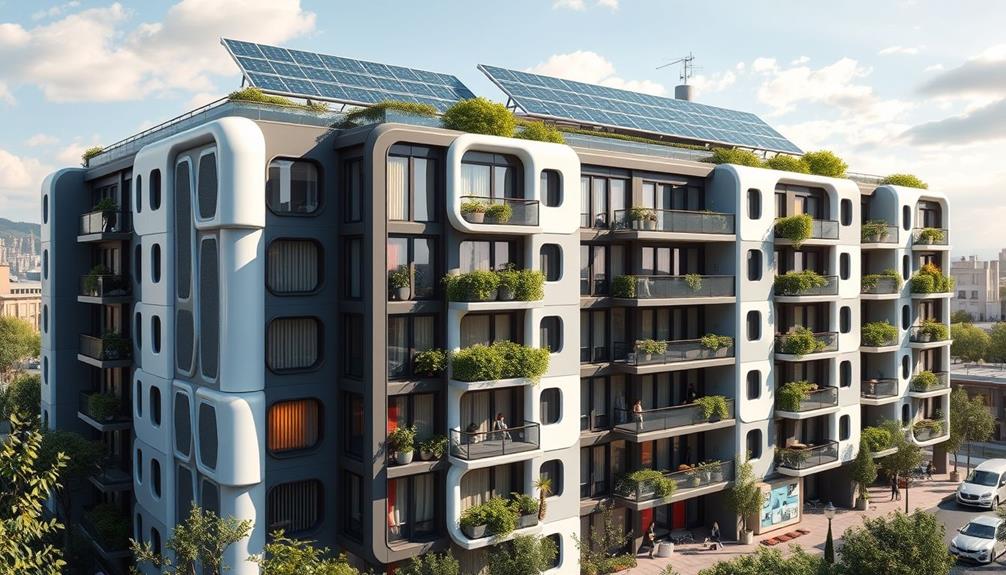
As the demand for energy-efficient solutions grows, the future of heat pump technology in multifamily buildings looks promising. New advancements are pushing the boundaries of efficiency, with models achieving Seasonal Energy Efficiency Ratio (SEER) ratings above 20. This means significant energy savings for you and your residents.
The trend towards electrification is gaining traction, as heat pumps emerge as a crucial solution for lowering greenhouse gas emissions in multifamily housing and enhancing financial security in retirement. Government incentives are likely to expand, making heat pump installations more accessible for property owners and developers like you. You'll find the initial investments increasingly attractive, enabling you to prioritize sustainability in your projects.
Additionally, ongoing research into hybrid systems that combine heat pumps with other technologies is enhancing energy efficiency and adaptability across various climates and building types.
With the rising awareness of climate change, the market demand for heat pumps is on the rise, establishing them as a preferred choice for multifamily housing. Embracing these innovations not only positions you as a leader in energy efficiency but also aligns your properties with the sustainability goals of today's conscientious consumers.
The future is bright for heat pump technology!
Strategies for Enhanced Efficiency

To maximize the efficiency of heat pumps in multifamily buildings, implementing strategic measures is essential. By focusing on advanced technologies and building improvements, you can considerably enhance performance and reduce costs.
For instance, utilizing a well-draining soil mix can provide a strong foundation for your building's energy systems, much like it does for ideal plant growth.
- Integrate smart thermostats and advanced controls: These tools enhance heat pump operation, potentially saving you up to 30% in energy costs.
- Conduct regular maintenance and performance monitoring: This can improve the Coefficient of Performance (COP) of your heat pumps, ensuring they run efficiently throughout their lifespan.
- Combine heat pumps with renewable energy sources: Utilizing solar panels alongside your heat pump can further enhance efficiency and lower operational costs.
Additionally, consider retrofitting your buildings to improve insulation and air tightness. This reduces heating and cooling loads, allowing your heat pumps to operate more effectively.
Implementing variable refrigerant flow (VRF) systems can also provide better temperature control in different zones, maximizing overall efficiency.
Frequently Asked Questions
What Is the Major Problem of Heat Pump?
The major problem with heat pumps is their high upfront installation costs. You might find it hard to justify the expense, especially if retrofitting your property adds complexity and further financial burden to the project.
Why Don T Contractors Like Heat Pumps?
Did you know nearly 60% of contractors hesitate to recommend heat pumps? They often find high upfront costs intimidating, lack training for installation, and worry about performance in extreme weather, making them reluctant to embrace this technology.
How to Improve the Efficiency of a Heat Pump?
To improve your heat pump's efficiency, regularly maintain it by cleaning filters and checking refrigerant levels. Guarantee proper installation and sizing, and consider using advanced controls or renewable energy sources for peak performance.
At What Temperature Does a Heat Pump Stop Being Efficient?
When outdoor temperatures drop below 30°F, your heat pump's efficiency starts to wane, and it may struggle to provide adequate heating. Below 25°F, consider supplemental systems to maintain comfort and reduce energy costs.
Conclusion
To sum up, if you think heat pumps in multi-family buildings are just a breeze, think again! You've got challenges galore, from installation nightmares to tenant complaints about temperature wars. But hey, with a sprinkle of innovation and a dash of teamwork, you can turn those chilly vibes into cozy comforts. So, roll up your sleeves, embrace the chaos, and remember: efficiency might be a tough nut to crack, but it sure beats the alternative—frozen toes!
Home Heating Solutions
Heat Pump Adoption Around the World: Global Trends and Lessons
With the rising trend of heat pump adoption globally, discover how countries are reshaping their energy landscape and what lessons await exploration.

Heat pump adoption is gaining momentum worldwide, driven by the need for energy efficiency and sustainability. Countries like Japan, Nordic nations, and those in Europe are leading the charge, with record installation numbers reflecting a strong shift towards decarbonization. You'll find that misconceptions about heat pumps, like their effectiveness in cold climates, are being dispelled as advanced models prove their efficiency. Government incentives are encouraging homeowners and businesses to invest, overcoming initial cost barriers. If you're curious about specific case studies and strategies that support this trend, there's more to discover.
Key Takeaways
- Heat pump adoption is vital for decarbonizing buildings and meeting global sustainability goals, with significant growth observed globally, especially in Europe and the U.S.
- Countries like Japan and Nordic nations lead in heat pump installations, driven by regulatory support and government incentives.
- Advanced heat pump technology achieves energy efficiencies exceeding 400%, effectively cooling and heating spaces even in extreme cold conditions.
- Misconceptions about heat pumps, such as their effectiveness in cold climates and installation costs, hinder adoption but can be addressed through education.
- Engaging Indigenous communities and incorporating their perspectives can enhance acceptance of heat pump technology and promote inclusive energy policies.
Global Sustainability Goals
Achieving sustainability is more than just a goal; it's a necessity for our planet's future. You mightn't realize it, but heat pump adoption plays an essential role in decarbonizing our buildings and meeting global sustainability goals.
By integrating renewable energy sources, heat pumps can considerably reduce greenhouse gas emissions compared to traditional fossil fuel heating methods. Additionally, utilizing geothermal energy generation in conjunction with heat pumps can further enhance energy efficiency and reliability.
Countries like Japan and Nordic nations demonstrate how effective heat pump systems can be when integrated into housing sectors. Their high adoption rates highlight the importance of energy efficiency in achieving net zero emissions. You can also contribute to this movement by considering heat pumps for your own home or encouraging local initiatives.
The Building Decarbonization Alliance emphasizes the need for regulatory interventions that promote heat pump adoption, supporting the shift towards all-electric buildings. Government incentives and rebates can make these systems more accessible, driving further adoption.
Heat Pump Technology Overview

Heat pumps are innovative systems that efficiently heat and cool your space by transferring heat with a compressor. They utilize refrigerant to absorb and release thermal energy, making them highly effective in various climates.
You've got two main types to choose from: air source and ground source, each offering unique benefits.
With impressive energy efficiency, these systems can save you a significant amount on your energy bills while meeting local energy codes, especially when considering thermal energy transfer basics.
Heat Pump Functionality Explained
One key innovation in modern climate control is the heat pump, which effectively transfers heat from one location to another. This versatile heat pump system can heat and cool spaces depending on the season, making it an ideal choice for year-round comfort. It operates using a compressor and a reversing valve, allowing it to switch between heating in winter and cooling in summer.
Heat pumps come in two main types: air source and ground source (geothermal). In cold climates, advanced models can achieve energy efficiency ratings exceeding 400%, remarkably outperforming traditional heating systems. This energy-efficient technology not only reduces greenhouse gas emissions but also brings economic benefits through lower energy bills.
Here's a quick comparison of heat pump types:
| Type | Heat Source | Efficiency Rating |
|---|---|---|
| Air Source Heat Pumps | Air | Up to 400% |
| Ground Source Heat Pumps | Ground/Water | Up to 600% |
| Reversible Systems | Air (Heating/Cooling) | Seasonal Efficiency |
| Economic Benefits | Lower energy costs | Reduced emissions |
Types of Heat Pumps
While many people may be familiar with heat pumps, understanding the different types can help you choose the right system for your needs. Here's a quick overview of the two main types of heat pumps:
– Air Source Heat Pumps: These extract heat from the air and can operate in temperatures as low as -15°C (5°F), making them versatile for various climates.
They're particularly useful in regions where energy efficiency is a priority, similar to the diversification benefits of a Gold IRA for financial portfolios.
– Ground Source Heat Pumps: Also known as geothermal systems, these draw heat from the ground or water sources.
While they require more extensive installation due to buried piping, they offer higher efficiency and lower operating costs over time. Their long-term reliability can be compared to the appreciation potential of gold investments.
– Reversible Functionality: Both types utilize a reversing valve, allowing them to function as heaters in the winter and air conditioners in the summer.
The adoption of heat pumps is rapidly increasing worldwide, with Europe leading the way, having installed a record 3 million heat pumps in 2022.
This trend reflects the growing awareness of their benefits and the need for efficient heating and cooling solutions.
Energy Efficiency Benefits
If you're looking for an effective way to reduce energy consumption in your home, heat pumps stand out as a leading solution. These systems can achieve energy efficiencies exceeding 400%, meaning they produce more energy than they consume. This efficiency is especially impressive in cold climates, where models operate effectively at temperatures as low as -15°C (5°F).
As the demand for sustainable solutions grows, there's also a rising need for professionals who can help implement these technologies effectively, similar to the growing demand for AI ethicists in tech who shape ethical guidelines for emerging technologies.
By installing heat pumps, you can considerably cut your energy usage compared to traditional fossil fuel heating systems. This not only lowers your energy bills but also helps reduce greenhouse gas emissions, contributing to a more sustainable future.
In fact, the U.S. has seen an 18% increase in ducted heat pump sales from 2018 to 2022, showcasing the growing recognition of their energy efficiency benefits.
Additionally, heat pumps enhance indoor air quality through improved ventilation, an essential aspect of energy-efficient building design.
In Europe, heat pump installations reached a record high of 3 million in 2022, reflecting their role in achieving energy efficiency goals.
With the added advantage of demand response capabilities, adopting heat pumps is a smart choice for both your home and the planet.
Addressing Common Misconceptions

When considering heat pumps, many misconceptions can cloud your judgment about their effectiveness and practicality. To help clear things up, here are a few common myths:
- Heat pumps are ineffective in cold climates.
- They're only suitable for single-family homes.
- Installation costs are prohibitive and not worth it.
In reality, specialized heat pumps exist that maintain efficiency even at -15°C (5°F). They work exceptionally well in all types of buildings, including multi-family housing and commercial spaces.
Additionally, understanding the unique needs of different environments, much like knowing the nutritional needs of dogs, can help in making informed decisions. While initial costs might be higher, the long-term energy savings make them a smart investment.
Another misconception is that heat pumps require extensive ductwork. Ductless options are available, making it easy to retrofit older buildings without existing systems.
Education on heat pump technology is crucial to dispel these myths, as a lack of awareness prevents wider adoption of these efficient systems.
Market Trends and Adoption Rates

As you explore the market trends and adoption rates of heat pumps, you'll notice significant growth in installations worldwide.
This surge is partly driven by the demand for energy-efficient home solutions, with many homeowners opting for technologies that enhance comfort while reducing energy costs.
Europe leads the charge with record numbers, while regions like Poland show rapid adoption rates that highlight regional differences.
Understanding these trends will help you appreciate how heat pump technology is reshaping the energy landscape globally.
Global Installation Growth
Heat pump adoption is skyrocketing worldwide, reflecting a major change in how we think about heating and cooling our homes. As countries aim for net zero emissions, heat pumps are becoming a key player in the energy transformation.
Recent insights suggest that incorporating energy-efficient technologies can greatly enhance overall energy savings. Here are some trends you should know:
- In 2022, Europe installed a record 3 million heat pumps, a nearly 40% increase from the prior year.
- Nordic countries lead the way, achieving notable penetration rates per 1,000 households.
- The U.S. market is catching up, with heat pump sales now matching traditional furnace sales, signaling a shift towards decarbonization.
Poland's remarkable 140% growth in heat pump installations shows how quickly adoption is rising across Europe.
Additionally, ducted heat pump sales in North America increased by 18% from 2018 to 2022, highlighting growing acceptance in residential and commercial buildings.
This surge isn't just about technology; it's about transforming our approach to energy use. As you consider your heating and cooling options, remember that choosing a heat pump is a step towards a more sustainable future.
Regional Adoption Differences
Across the globe, adoption rates for heat pumps vary considerably, reflecting each region's unique climate, energy policies, and consumer preferences. In 2022, European countries showcased a strong commitment to heat pump installations, reaching a record high of 3 million units—an almost 40% increase from the previous year. This significant growth aligns with the trend of importance of metrics in understanding consumer behavior and optimizing marketing strategies.
Nordic nations lead the way, benefiting from their colder climates and higher heating demands, which drive significant market penetration.
Meanwhile, China dominated global sales, emphasizing its focus on energy efficiency and decarbonization initiatives. In North America, particularly the U.S., the heat pump market is growing, with ducted heat pump sales increasing by 18% from 2018 to 2022. This suggests a rising awareness of the advantages heat pumps offer over traditional heating systems.
Notably, Poland experienced a remarkable 140% growth in heat pump installations, a clear sign of a shift toward energy-efficient solutions driven by supportive regulations and consumer demand.
As you explore these regional differences, it's evident that understanding local contexts is essential for driving heat pump adoption and achieving energy efficiency goals worldwide.
Installation Challenges and Solutions

While many homeowners are keen to adopt heat pump technology, several installation challenges can hinder the process. Understanding these challenges can help you make informed decisions and guarantee your HVAC system operates efficiently.
Additionally, the mental health of homeowners can play a role in their decision-making process, as stress from potential high costs or installation complications may lead to anxiety. Emotional support during the grieving process is essential for caregivers when maneuvering such changes in home comfort.
- Higher Initial Costs: The upfront installation costs for heat pumps can be greater than traditional systems, but government incentives can help alleviate this burden.
- Proper Sizing: Confirming your heat pump is the right size is essential. Improper installations can lead to inefficiencies, increasing energy costs.
- Retrofitting Needs: Modifications to your ductwork or opting for ductless systems may be necessary if you're retrofitting an existing home.
In colder climates, advanced heat pump models can function reliably at temperatures as low as 5°F (-15°C), dispelling myths about their inefficiency.
Additionally, local climate conditions greatly affect which heat pump system is best suited for your home, especially for ground-source systems that require ample land and specific feasibility assessments.
Community and Indigenous Engagement

Recognizing the importance of community and Indigenous engagement can greatly enhance the adoption of heat pump technology. When you engage Indigenous communities in discussions about heat pumps, you open doors to awareness and understanding of their benefits. This dialogue promotes sustainable practices that align with traditional ecological knowledge, which is invaluable for creating effective energy initiatives.
Studies have shown that astrology and attractiveness can influence how communities perceive new technologies, potentially impacting their acceptance and integration.
Acknowledge the traditional territories of Indigenous peoples to foster respectful relationships and collaboration. By integrating Indigenous perspectives into your energy initiatives, you can develop more inclusive policies and programs that respect cultural values and land stewardship. This approach not only honors Indigenous wisdom but also enriches the overall community engagement process.
Moreover, community engagement strategies that actively involve Indigenous voices can facilitate greater acceptance of heat pump technology among diverse populations. The HVAC 2.0 Program highlights the need for improved business models for HVAC contractors, which can lead to better client satisfaction.
Frequently Asked Questions
What Is the Trend in the Heat Pump Market?
You'll notice a growing trend in the heat pump market, with significant increases in installations across Europe, the U.S., and China. More homeowners recognize their benefits, driving demand for efficient heating and cooling solutions.
Which Countries Use Heat Pumps the Most?
Countries like Japan, China, and Nordic nations lead in heat pump usage. In Japan, almost all multifamily homes have them. You'll also find significant growth in Poland and increasing adoption in the U.S. market.
What Is the Future of Heat Pump Technology?
The future of heat pump technology looks promising. You'll see innovative designs, improved efficiency, and increased adoption as more people recognize the benefits. Embracing these advancements will help you achieve sustainable energy solutions for your home.
What Is the Adoption Rate for Heat Pumps?
The adoption rate for heat pumps is rising steadily. In the U.S., ducted heat pump sales increased by 18% since 2018, while Europe installed a record 3 million units in 2022, showcasing their growing popularity.
Conclusion
In embracing heat pump technology, you're stepping into a world of sustainability that not only meets global goals but also enriches your community. While there may be a few bumps along the way, the journey towards cleaner energy is worth every effort. By addressing misconceptions and overcoming challenges together, you're not just adopting a solution; you're fostering a brighter, greener future for everyone. So, let's celebrate the progress and keep the momentum going!
Home Heating Solutions
The Future of Grid Integration: How Heat Pumps Can Balance Energy Demand
You’ll discover how heat pumps can revolutionize energy consumption and pave the way for a sustainable future, but what are the key benefits?

Heat pumps play a pivotal role in balancing energy demand as grid pressures mount. They respond dynamically to energy signals, reducing peak demand by adjusting operations in real time. When you use a heat pump, you can enjoy significant energy efficiency—turning 1 kWh of electricity into 3-4 kWh of heat. Dual-fuel systems enhance reliability while smart controls adapt based on electricity prices and weather. By integrating heat pumps with renewable energy and demand response programs, you contribute to a greener grid. Explore how this technology can transform your energy consumption and sustainability efforts for a better future.
Key Takeaways
- Heat pumps can reduce peak energy demand by up to 40% through demand response programs, optimizing energy usage during high-demand periods.
- Advanced algorithms and smart energy management systems enhance heat pump performance, improving grid stability and reducing peak demand contributions by 32% by 2045.
- The integration of heat pumps supports renewable energy adoption, with efficiency rates converting 1 kWh of electricity into 3-4 kWh of heat.
- Dual-fuel systems combine electric heat pumps with gas backups, providing reliability and contributing to overall grid stability during extreme weather or outages.
- Educating consumers about heat pump benefits and financial incentives can facilitate wider adoption and lower overall energy costs in local districts.
Winter Heating Challenges
Winter heating challenges can put a serious strain on energy resources, often leading to higher costs and stress on the electric grid. During the cold months, your heating demand spikes, especially during peak demand events that typically occur just a few times a year.
These peaks usually happen in the early morning hours when everyone cranks up their heat pumps to stay warm. Understanding the principles of thermal energy transfer can help users optimize their heat pump performance, making it easier to manage energy consumption. This surge in energy consumption can overwhelm the grid, making it essential to manage your energy use effectively.
Demand response programs come into play here, allowing for automated adjustments in heat pump operations. By participating in these programs, you can help reduce overall energy usage during peak times, which not only saves you money but also supports grid stability.
Moreover, adhering to the AHRI 1380 standard can enhance your heat pump's efficiency, making it easier to integrate into these demand response strategies.
Demand Response Capabilities

Demand response capabilities are revolutionizing how we manage energy consumption during peak demand periods. By leveraging the flexibility of heat pumps, these programs can achieve a peak demand reduction of up to 40%. This is essential for utilities as it helps balance energy loads during high-demand times.
Additionally, implementing a balanced approach to energy use, similar to gout management insights, can aid in sustaining overall efficiency during these significant times.
Heat pumps equipped with demand response functionality can adjust their operations in real-time based on grid signals. This means that when the grid is under stress, your heat pump can optimize energy use while maintaining comfort in your home.
Smart thermostats integrated with heat pumps play a key role here, communicating with utility systems to facilitate necessary temperature adjustments.
Additionally, by pre-heating your home before peak demand periods, these heat pumps allow for a reduced power draw when it's most needed, ensuring your indoor comfort remains intact.
The integration of advanced control systems further supports automation in demand response, enhancing overall energy efficiency and improving grid management during peak load events.
This synergy between heat pumps and demand response not only benefits individual consumers but also contributes to a more stable and efficient energy grid.
Advantages of Heat Pumps

Heat pumps offer a multitude of advantages that make them an attractive choice for both homeowners and businesses. They're highly efficient, capable of converting 1 kWh of electricity into 3-4 kWh of heat, which helps you manage your electricity consumption effectively. As the demand for renewable energy sources grows, your investment in heat pumps can greatly contribute to the energy shift.
Here's a breakdown of some key benefits:
| Advantage | Description | Impact on Energy Demand |
|---|---|---|
| High Efficiency | Converts 1 kWh to 3-4 kWh of heat | Lowers overall energy use |
| Increased Popularity | 40% sales increase in the EU in 2022 | Boosts renewable technology |
| Cost Savings | Participate in demand response programs | Reduces your energy bills |
| Emission Reduction | Potential to cut global CO2 emissions greatly | Supports sustainable practices |
With projections suggesting heat pumps could address nearly 20% of total heating needs in buildings by 2030, adopting this technology positions you at the forefront of a sustainable energy future.
Energy Efficiency With Dual-Fuel Systems

Integrating electric heat pumps with gas backup systems creates a dual-fuel setup that maximizes energy efficiency and reliability. This combination allows you to enjoy efficient heating while ensuring a dependable alternative during peak demand periods or power outages.
With smart control systems, dual-fuel systems make real-time decisions based on factors like electricity prices and weather forecasts, optimizing your energy use and costs. Additionally, understanding the importance of regular maintenance in other systems, such as toilet maintenance, can provide insights into how proactive measures enhance overall efficiency.
By utilizing heat pumps in conjunction with gas backups, you can benefit from lower operational costs. Electric heat pumps provide an efficient heating solution, while the gas backup kicks in when needed, especially during extreme weather conditions when electricity supply may be strained.
This resilient approach not only keeps your home comfortable but also contributes to overall grid stability. Moreover, the coordination of demand response initiatives within these dual-fuel systems encourages diverse participation.
This helps balance energy demand, particularly during peak periods, making it easier for the grid to maintain stability. Ultimately, adopting dual-fuel systems allows you to enhance your home's energy efficiency while supporting a more resilient energy infrastructure.
Future Innovations in Heat Pump Technology

As energy efficiency continues to evolve, innovative heat pump technologies are leading the way in decarbonizing both space heating and cooling.
These advancements not only enhance energy efficiency but also contribute to grid stability and reduce peak demand. The integration of geothermal energy into heat pump systems can further enhance their effectiveness, allowing for a more reliable energy source.
- Reversible heat pump systems are becoming increasingly popular for their dual functionality.
- Advanced algorithms optimize heat pump performance, potentially cutting peak demand by 32% by 2045.
- Smart operation controls enable heat pumps to adapt to real-time electricity forecasts, promoting greener energy usage.
- Research into hybrid energy systems aims to integrate heat pumps with blockchain technology for peer-to-peer energy trading.
With these innovations, you can expect to see a significant increase in the adoption of heat pumps.
Global sales are projected to rise from 10% of heating needs in 2021 to nearly 20% by 2030.
This trend reflects a broader shift towards more sustainable energy solutions, where heat pumps play an essential role in balancing energy demand.
Smart Energy Management Systems

Smart energy management systems (SEMS) let you harness real-time data to optimize your heat pump's performance.
By integrating advanced algorithms for AI-driven threat intelligence, these systems adjust operations to enhance grid stability during peak times.
You'll not only enjoy a more comfortable home but also contribute to a more efficient energy landscape.
Real-time Data Utilization
Real-time data from heat pumps is revolutionizing how energy is managed in homes. By utilizing this data, smart energy management systems optimize your energy consumption based on current electricity prices and grid demand. This means you can adjust your energy use to avoid peak demand periods, ultimately saving on your bills and contributing to a more reliable grid.
Additionally, pool maintenance equipment can be integrated into smart systems to enhance overall home efficiency by managing energy use during off-peak hours.
Here's how real-time data enhances energy management:
- Dynamic adjustments: Communicate with grid operators to lower power draw during high-demand times.
- Smart thermostat integration: Enable precise temperature control based on real-time weather forecasts and energy availability.
- Demand response programs: Achieve up to a 40% reduction in peak demand, balancing energy loads effectively.
- Enhanced grid stability: Support a sustainable energy grid through smart consumption management.
Automated Demand Response
Automated demand response (ADR) is transforming how you manage energy consumption in your home. With smart energy management systems, you can now dynamically adjust your heat pump operations based on real-time electricity pricing signals. This innovative approach is increasingly essential as the AI applications in various industries evolve to enhance energy efficiency.
It means you can markedly reduce peak demand during high consumption periods, which is vital for maintaining grid stability. By utilizing ADR, your heat pumps can lower energy consumption by up to 40% during peak load events.
Smart thermostats integrated with your heat pumps communicate seamlessly with utility systems, allowing you to pre-heat your home before peak periods. You'll stay comfortable while minimizing power draw when it matters most.
The AHRI 1380 standard further enhances the efficiency and control of heat pumps, optimizing their performance within automated demand response programs. Engaging in demand response initiatives not only helps you balance energy demand but also translates into lower energy bills.
Plus, you're contributing to a more sustainable energy future. Incorporating automated demand response into your energy management strategy empowers you to take charge of your energy consumption while helping the electric grid operate more effectively.
Grid Stability Enhancement
Managing energy consumption effectively not only benefits you but also supports the overall stability of the grid. Smart energy management systems are key to achieving this balance, especially when it comes to heat pumps. By utilizing demand response programs, these systems allow heat pumps to adjust their operations, greatly reducing peak demand. This can enhance grid stability by up to 40% during high energy consumption periods.
Additionally, as businesses grapple with challenges like email and communication security, optimizing energy systems is essential for minimizing operational disruptions.
Here are some ways heat pumps contribute to grid stability:
- Real-Time Optimization: They adjust energy use based on real-time electricity pricing and forecasts.
- Efficient Communication: The AHRI 1380 standard guarantees these systems operate efficiently and communicate well with utilities.
- Local Energy Markets: Heat pump flexibility can lead to economic benefits through local energy trading and peer-to-peer transactions.
- Future Predictions: AI simulations indicate that heat pumps could lower their peak demand contribution by 32% by 2045.
Renewable Energy Integration

Renewable energy integration is revolutionizing how we power our homes and businesses. With heat pumps, you can convert 1 kWh of electricity into 3-4 kWh of heat, greatly boosting energy efficiency and supporting the integration of renewable sources like solar and wind into the power grid.
As global heat pump capacity is projected to rise from 1,000 GW in 2021 to nearly 2,600 GW by 2030, these systems are set to cover about 20% of total heating needs in buildings. Additionally, the use of ozone air purifiers can complement energy efficiency efforts by improving indoor air quality, making homes healthier and more comfortable.
This widespread deployment is expected to reduce natural gas consumption in the EU by 21 bcm by 2030, aligning with renewable energy goals and enhancing energy security amid fluctuating gas prices. By embracing time-of-use pricing and demand response programs, you can optimize your energy consumption, shifting heating to times of lower renewable energy costs. This not only helps in managing electricity demand but also supports grid stability.
In local energy markets, a district with 40% heat pump adoption can see a 5.1% cost reduction in energy expenses. This illustrates how heat pumps can enhance local renewable energy integration while improving economic efficiency.
Consumer Empowerment and Education

You have the power to make informed choices about your energy use, and understanding heat pumps is an essential step.
By learning about how these systems work and their benefits, you can support renewable energy adoption and lower your energy costs.
Incorporating a holistic lifestyle approach can empower you to optimize your energy consumption effectively.
Empowering yourself with this knowledge not only helps you save money but also contributes to a more sustainable future.
Educating About Heat Pumps
Heat pumps can be a game changer for homeowners looking to cut energy costs and reduce their carbon footprint. By understanding how heat pumps work and the advantages they offer, you can make informed decisions that benefit both your wallet and the environment.
Here are some key points to take into account:
- Heat pumps convert 1 kWh of electricity into 3-4 kWh of heat, showcasing their energy efficiency.
- The recent 40% surge in heat pump sales in the EU reflects growing consumer awareness and acceptance.
- By 2025, variable tariffs in Germany will allow you to optimize heat pump usage during low-cost periods, enhancing your savings.
- Government incentives can help offset installation costs, promoting the wider adoption of heat pumps.
Educating yourself about heat pumps not only empowers you to save money but also aligns with the integration of renewable energy sources, like solar power.
Promoting Renewable Energy Adoption
In today's energy landscape, the change towards sustainable solutions is more essential than ever, and consumers play an important role in this transformation. By embracing heat pumps, you can notably boost renewable energy adoption while reducing your energy consumption. Heat pumps efficiently convert green electricity sources, like solar power, into usable heat, making them a smart choice for eco-conscious homeowners.
| Benefits of Heat Pumps | Impact on Renewable Energy |
|---|---|
| Efficient energy conversion | Supports green electricity use |
| Reduces reliance on fossil fuels | Lowers overall carbon emissions |
| Cost savings through variable tariffs | Encourages off-peak energy use |
| Increases home value | Enhances energy independence |
As electricity suppliers in Germany move towards variable tariffs by 2025, you'll have the opportunity to optimize your heating schedules for lower costs. With anticipated heat pump sales rising from 2 million in 2021 to 7 million by 2030, it's clear that collaborative efforts between government and industry will empower you to adopt renewable solutions. Join this movement and leverage heat pumps to balance your electricity supply and contribute to a sustainable future.
Economic Impact of Heat Pumps

The integration of heat pumps into local energy markets can considerably transform economic dynamics for consumers. By adopting heat pumps, you can notably lower your energy costs. In districts with 40% heat pump integration, energy expenses can drop by 5.1%. Additionally, participating in local peer-to-peer energy trading markets can save you at least 6.2% on your energy bills.
Here are some key economic impacts of heat pumps:
- Homes with heat pumps can take advantage of demand response programs, achieving a 40% reduction in peak demand.
- Combined storage solutions with heat pumps may yield savings of 24%-31%.
- The growing heat pump market, projected to expand from 1,000 GW to nearly 2,600 GW by 2030, supports your journey toward Net Zero.
- Increased adoption is expected to decrease natural gas consumption in the EU by 21 bcm by 2030, enhancing energy security.
In this evolving landscape of power supply and demand, heat pumps not only support sustainability but also create a more reliable and cost-effective energy future for you and your community.
Overcoming Barriers to Adoption

To adopt heat pumps more widely, you need to understand the financial incentives available and how they can reduce your initial costs.
Education and awareness efforts are essential to help you see the long-term benefits and savings these systems offer.
Financial Incentives for Adoption
Maneuvering the costs of heat pump installation can be intimidating, but financial incentives play an essential role in easing this burden. Government subsidies and tax credits notably reduce upfront costs, making heat pumps more accessible for you and your community.
These incentives not only lower your initial investment but also promote energy efficiency and sustainable heating solutions.
Here are some key financial incentives to contemplate:
- Government subsidies: Programs that help offset installation costs.
- Tax credits: Deductions that can markedly decrease your tax bill.
- Energy efficiency grants: Funds available for retrofitting buildings with heat pumps.
- Collaborative programs: Partnerships between government and industry that enhance financial support.
In Germany, for example, an SG-ready interface is necessary for subsidy eligibility, encouraging heat pump adoption and smart grid integration.
Research shows that these financial incentives can lead to a notable increase in heat pump adoption rates, facilitating a shift toward energy independence.
Education and Awareness Efforts
Understanding the benefits and functionalities of heat pumps is essential for boosting their adoption. Education initiatives play a pivotal role in informing you about how heat pumps can convert 1 kWh of electricity into 3-4 kWh of heat, promoting energy efficiency and sustainability.
To enhance consumer engagement and overcome barriers, consider the following:
| Education Focus | Benefits | Action Steps |
|---|---|---|
| Heat Pump Functionality | Increased awareness of efficiency | Attend workshops and webinars |
| Misconceptions in Climate | Understanding performance in cold | Participate in local campaigns |
| Government Incentives | Making installations affordable | Research available programs |
| Renewable Energy Integration | Enhancing self-sufficiency | Explore solar energy options |
| Reskilling for Installers | Meeting growing demand | Support training programs |
Frequently Asked Questions
What Is the Future of Heat Pump Technology?
The future of heat pump technology looks promising. You'll see increased efficiency, smarter systems, and greater integration with renewable energy sources, all aimed at cutting costs and enhancing energy security while meeting growing heating demands worldwide.
What Is the New Heat Pump Technology in 2024?
You might think heat pumps can't keep up, but in 2024, they'll revolutionize energy use. With enhanced efficiency and smart controls, they're set to transform your heating, making it more sustainable and cost-effective than ever.
What Is the Integration of Heat Pump?
The integration of heat pumps involves connecting them to smart grids, enabling real-time communication. You can optimize energy usage, reduce costs, and maintain comfort by using control signals during peak demand periods, enhancing overall system efficiency.
Will a Heat Pump Raise My Electric Bill?
Imagine watering a garden. Initially, the hose uses more water, but over time, your plants thrive with less effort. A heat pump might raise your bill initially, but it can save you money in the long run.
Conclusion
In the journey toward a sustainable energy future, embracing heat pumps is essential. As the saying goes, "A stitch in time saves nine." By integrating these efficient systems now, you'll not only balance energy demand but also pave the way for renewable sources. With advancements in technology and increased consumer awareness, heat pumps can transform your heating experience while contributing to a greener planet. Don't wait—act today to harness the benefits and secure a sustainable tomorrow.
Home Heating Solutions
Heat Pumps and Indoor Plants: Creating the Ideal Growing Environment
Incorporating heat pumps can transform your indoor gardening experience, but understanding their impact on plant health is essential for thriving growth. Discover how to optimize your setup!
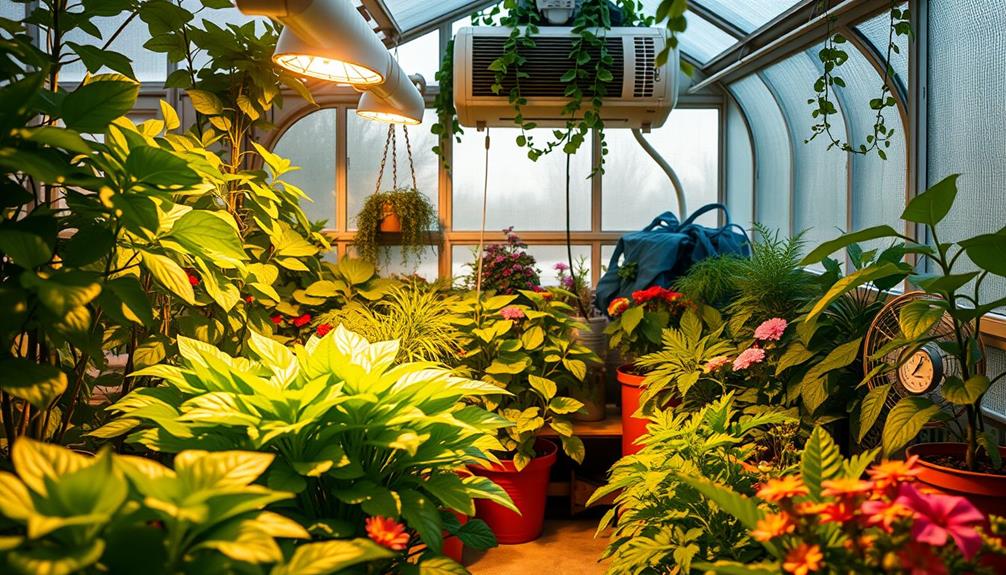
Using heat pumps is a great way to create the perfect growing environment for your indoor plants. They help maintain a consistent temperature between 18-24 degrees Celsius, which is ideal for most houseplants. Make certain to avoid cold drafts or excessive heat from nearby HVAC units to keep your plants stress-free. Additionally, monitor humidity levels, as plants thrive in 40-60% moisture. Integrate proper lighting and water practices for different plant types to maximize their health. By optimizing these factors, you can guarantee abundant growth—keep going to discover more tips for nurturing your indoor garden!
Key Takeaways
- Heat pumps maintain a consistent indoor temperature, ideal for most house plants (18-24 degrees Celsius) year-round.
- Avoid placing plants near HVAC units to prevent cold drafts or overheating, which can stress them.
- Regularly monitor indoor temperatures with a thermometer to ensure stability and comfort for your plants.
- Consider using plant heat mats or oil heaters for temperature-sensitive species during the winter months.
- Group plants together to create a microclimate, enhancing humidity and warmth around them, especially in cooler seasons.
Temperature Regulation for Plants
To keep your indoor plants thriving, you need to maintain a stable temperature. Most house plants prefer temperatures ranging from 18-24 degrees Celsius. If temperature drops below this range, your plants can become stressed, leading to poor growth or even death.
It's essential to create an ideal environment without extreme fluctuations. Utilizing a heat pump can enhance your indoor climate control by guaranteeing a consistent temperature, which is crucial for optimal thermal energy transfer for plant health, as highlighted in thermal energy transfer basics.
Using heat pumps is an effective way to keep temperatures consistent. They prevent cold drafts and overheating, which can occur near air conditioning units or heating vents. Make sure to position your plants away from these sources to avoid localized temperature extremes that can harm their health.
Regularly monitor indoor temperatures with a thermometer to confirm they stay within the preferred range.
During colder months, consider utilizing oil heaters or plant heat mats for temperature-sensitive species. These options can provide important warmth, helping to maintain the health of your plants when the temperature drops.
Optimizing Light Exposure
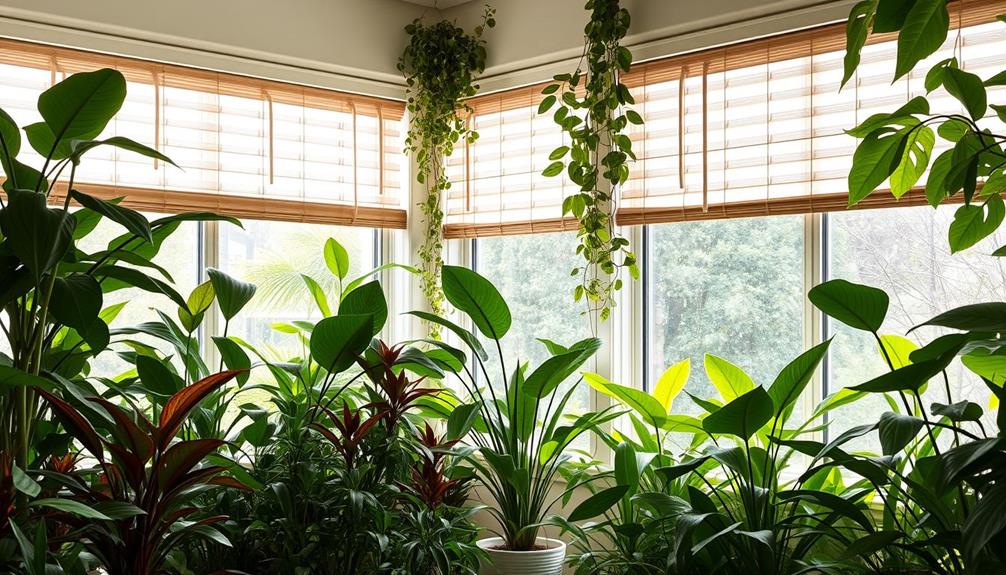
Maximizing light exposure is crucial for the health and energy of your indoor plants. Positioning your plants near south or west-facing windows helps them soak up weaker winter sunlight, which is essential for their growth and vibrant colors. To further enhance light exposure, consider using grow lights like Sansi 24 watt or 15 watt bulbs during shorter daylight hours.
Additionally, keep your windows clean—dust can notably block sunlight from reaching your plants. Regularly rotating your pots guarantees that all sides receive even light, preventing uneven growth and promoting a balanced shape. If direct sunlight is too harsh, use sheer curtains to filter the light, protecting your plants from potential leaf burn while still allowing enough light to come through.
Here's a quick reference to optimize light exposure for your indoor plants:
| Action | Benefit |
|---|---|
| Position near south/west windows | Maximizes sunlight exposure |
| Use grow lights | Supplements natural light |
| Clean windows | Improves light penetration |
| Rotate pots | Promotes even growth |
| Use sheer curtains | Protects from leaf burn |
Taking these steps can create an ideal light environment for your house plants to thrive.
Managing Humidity Levels
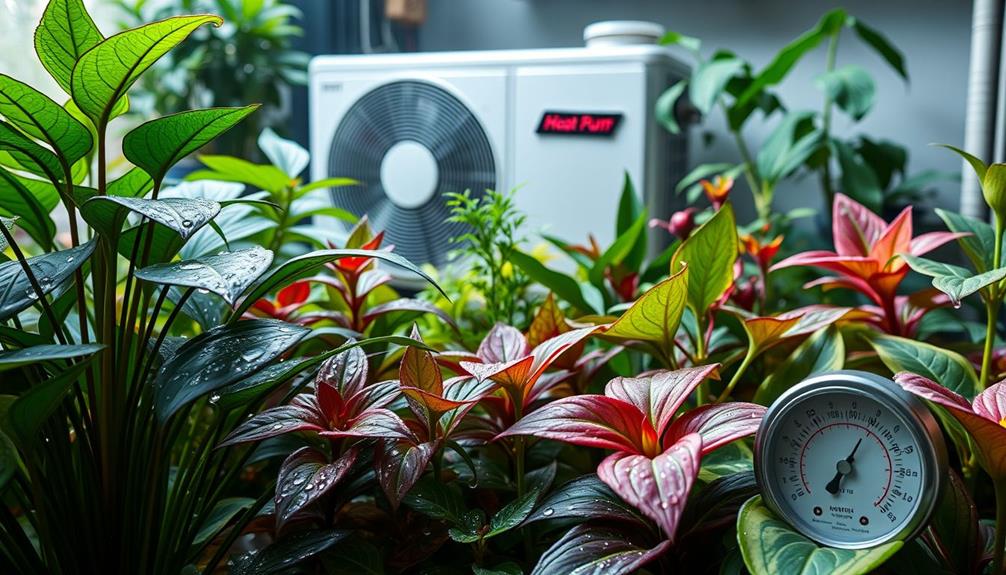
Proper humidity levels are essential for keeping your indoor plants healthy and thriving. Most indoor plants prefer humidity between 40-60%, and dry air can lead to leaf browning and stress. Unfortunately, heat pumps often circulate dry air, inadvertently lowering humidity levels in your home.
To maintain ideal conditions, monitor humidity with a hygrometer and take action if levels drop. Incorporating organic matter into your plant's soil, such as well-draining soil mix, can also aid in moisture retention. Consider using a humidifier to add moisture to the air, especially during the winter months. Alternatively, you can place water trays near heat sources to create a more humid environment.
Grouping your plants together can also help; as they transpire, they release moisture into the air, creating a beneficial microclimate.
Regular misting might seem like a good solution, but it's generally ineffective for increasing humidity during winter. Instead, focus on using tools that maintain consistent moisture levels in the air.
Watering Practices in Winter
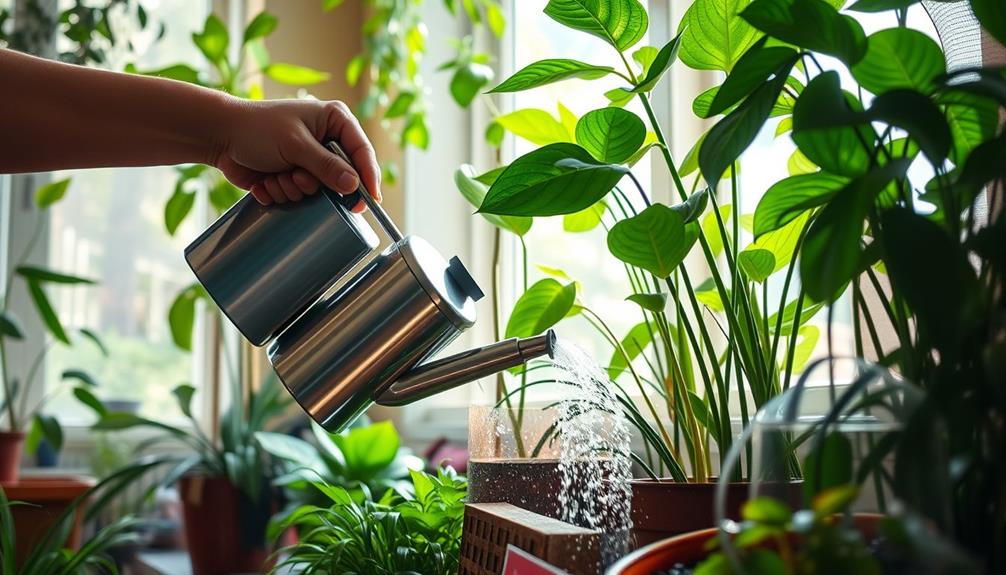
As you're managing humidity levels for your indoor plants, it's equally important to adjust your watering practices during the winter months. Most houseplants enter a period of dormancy and require less water, typically every 2-3 weeks. Overwatering in low light conditions can lead to root rot, so it's vital to keep an eye on soil moisture.
For succulents, a monthly watering is sufficient, while cacti often don't need any water at all during this season. Additionally, using an effective air purifier can help maintain a balanced indoor environment for your plants, reducing pollutants that may affect their health.
To accurately gauge when to water, use moisture sensors or a wood dowel to check soil moisture at the root level; the finger test can be unreliable in colder months. Always make sure your pots have proper drainage to prevent "wet feet," which is particularly harmful in winter.
Opt for light, free-draining soil mixes rather than high water retention substrates, as these support healthier root systems. Lastly, remember that placing your plants in direct sun can also affect how quickly the soil dries out.
Adjust your watering frequency accordingly, giving your plants exactly what they need to thrive during the winter chill.
Pest Control Strategies
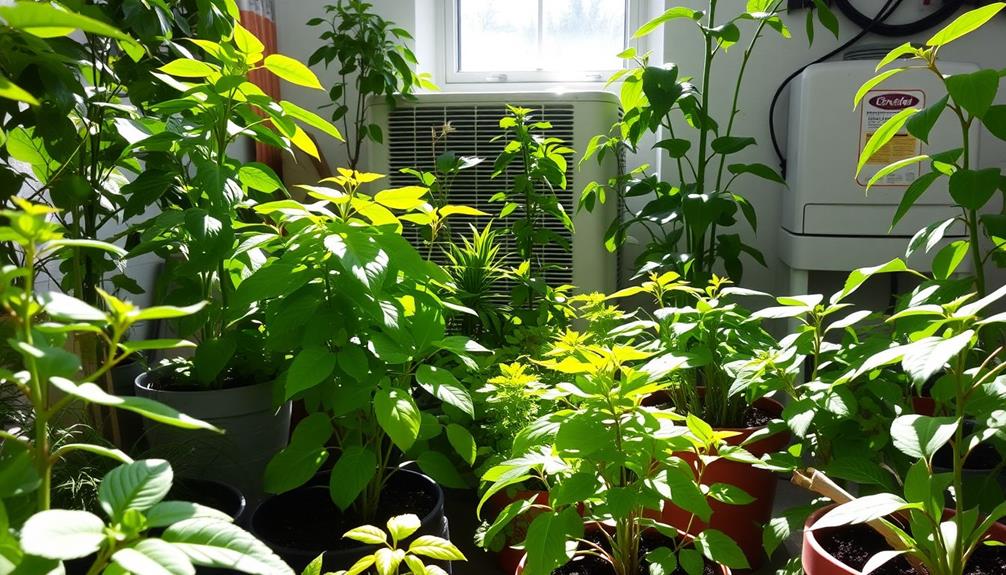
During the winter months, keeping a close eye on your indoor plants is essential for effective pest control. Regular inspections help you spot common pests like thrips and fungus gnats before their infestations spiral out of control.
If you get new outdoor plants, quarantine them for at least four weeks to avoid introducing pests to your indoor collection. Additionally, introducing unique Akita names can create a fun and engaging atmosphere while caring for your plants, making the task feel more enjoyable.
A simple yet effective strategy is cleaning leaves to remove dust, which enhances photosynthesis and reduces the likelihood of pest infestations by eliminating their hiding spots. You should also prune any dead or yellowing leaves; this not only promotes healthier growth but also minimizes the risk of attracting pests to weakened plants.
If you do encounter pests, consider using natural pest control methods. Insecticidal soap or neem oil can effectively manage pest populations without harming your plants.
Frequently Asked Questions
Should I Leave the AC on for My Plants?
If you're considering leaving the AC on for your plants, it can help maintain a stable temperature and prevent overheating. Just make sure to position them away from the AC to avoid stress.
What Is the Perfect Environment for a Plant to Grow?
To create the perfect environment for your plants, maintain temperatures between 18-24°C, guarantee 40-60% humidity, provide bright, indirect light, use well-draining soil, and promote good air circulation to encourage healthy growth.
Does Air Conditioning Affect Houseplants?
You might not realize it, but air conditioning's cool breeze can actually harm your houseplants. Keeping them six feet away from those units is essential to prevent stress, browning leaves, and moisture loss.
How Often Should I Mist My Plants in Winter?
You should mist your plants once a week during winter if they show signs of low humidity, like crispy leaf edges. For humidity-loving varieties, consider using a humidifier for more consistent moisture levels.
Conclusion
To sum up, nurturing your indoor plants with the right heat pump setup is like tending to a delicate garden of dreams. By carefully regulating temperature, optimizing light, managing humidity, and adjusting your watering practices, you create a thriving environment where your plants can flourish. Remember, a little attention goes a long way. Embrace the challenge, and you'll be rewarded with vibrant greenery that breathes life into your space. Your plants are counting on you!
-

 Residential and Commercial Applications7 months ago
Residential and Commercial Applications7 months agoBest Amana Heat Pump Reviews
-

 Thermal Energy Transfer7 months ago
Thermal Energy Transfer7 months agoBreakthroughs in Modern Heat Pump Systems: Thermal Energy Edition
-

 Geothermal Heat Pumps6 months ago
Geothermal Heat Pumps6 months agoInnovative Geothermal Heat Pump Manufacturers Revolutionize Energy Efficiency
-

 Residential and Commercial Applications7 months ago
Residential and Commercial Applications7 months agoBest Heat Pump
-

 Geothermal Heat Pumps6 months ago
Geothermal Heat Pumps6 months agoUpgrade Your Comfort with Our Efficient HVAC Systems
-

 Air Conditioning5 months ago
Air Conditioning5 months agoExploring Energy-Efficient Air Conditioning Heat Pumps
-

 Energy Consumption3 months ago
Energy Consumption3 months ago10 Key Comparisons: Heat Pump Vs Traditional Heating
-

 Thermal Energy Transfer4 months ago
Thermal Energy Transfer4 months agoBoost Your Heat Pump Efficiency: Interactive Guide








